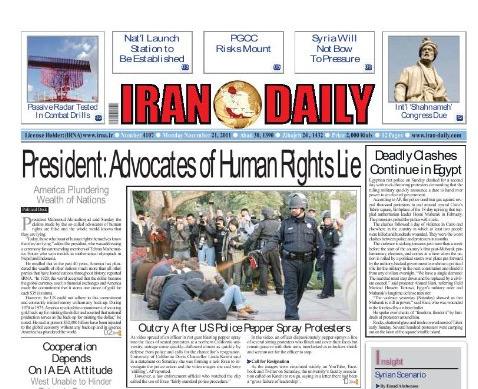UPDATES
Iran fighting to control the message
November 23, 2011 | Daniel Meyerowitz-Katz

New York Times journalist Rick Gladstone has reported on a rare act of defiance from Iran’s internal media, stemming from an all-too-familiar crackdown on the messages that media officials disseminate.
Iran’s main government-run newspaper was published Tuesday without a front-page headline, replaced by photographs of its headquarters during an assault the day earlier by forces working for the judiciary who briefly arrested its top official – the media adviser to the president – and more than 30 others.
The presentation of the front page appeared to be an act of protest by the newspaper over the unusual episode on Monday, which judiciary officials described as a “riot” carried out by newspaper employees
… The president, Mahmoud Ahmadinejad, had threatened to personally intervene on Monday to free his media adviser, Ali Akbar Javanfekr, who is the chief executive of the official Islamic Republic News Agency and the manager of its affiliated newspaper, called Iran.
Mr. Javanvekr was handcuffed for an hour in his office of the Tehran-based newspaper by armed officers of the judiciary, which is run by Ayatollah Sadegh Larijani, a member of a powerful conservative family in Iran that has aligned itself against Mr. Ahmadinejad. Among the others who were arrested, at least one was beaten and hospitalized.
While Mr. Javanvekr was later released, the fate of the others is not known, nor are the precise reasons clear for the assault on the headquarters. But the smattering of Iranian news accounts about the episode have hinted at the brutish underside to the political rivalries among the conservatives who dominate in Iran.
There seem to be numerous theories as to why Javanvekr and his employees were subjected to this treatment. These range from remarks he made against the ultra-conservative clerics who rule Iran, to comments he made encouraging more liberal dress codes for women, to the theory that this is simply the Ayatollahs flexing their muscle in front of a an influential friend of the President, who is currently engaged in a power struggle with the Supreme Leader.
An illuminating article on the extent to which the Iranian state controls the message that its media can broadcast was written last week by Jody Sabral, a former reporter for the Iranian state-run Press TV. Writing for the Doha Centre for Media Freedom, Sabral reflects on how she joined the network as a young idealist, hoping to make a positive change.
Like many print journalists looking for a lucky break into broadcast, I jumped at the chance to report on Turkey and joined the channel in 2007. As an accredited member of the press and Istanbul resident, I was fascinated by the relationship between Turkey and Iran. It was an exciting prospect to be part of a new world which challenged western news agencies’ agenda. I was part of a group of professional journalists and we believed we could influence the channel in a positive way.
Unfortunately, Sabral eventually came up against the harsh reality which comes with working for a state-controlled entity that is forced to rigidly adhere to an approved line. As she recounts, the Iranian regime did not want to speak out against its friends in the Assad regime in Syria, therefore it completely ignored the violence in Syria for months. When it finally decided to mention Syria, it was not the protests and the violence that she was told to to report, but a fabricated conspiracy theory that Turkey was smuggling weapons into the country to fuel a civil war. It is significant that this came just after the Turkish Prime Minister did an about-face on Syrian President Bashar al-Assad, who had previously been not just an ally but a personal friend.
After months of ignoring the Syrian opposition, the day finally came when Press TV called me to cover something. As thousands of Syrian refugees poured into Turkey to escape the violence across the border, a newsroom producer called asking whether I could go to the refugee camps close to the Turkish-Syrian border. I asked the producer about Press TV’s editorial position on the story. “We’re not denying there is a crackdown going on in Syria but we believe Turkey is gun running into the country to create a Libyan-style civil war,” he said.
When I asked what our source was, he couldn’t answer, and instead he replied: “Turkey will do anything to get into the EU.” It was a laughable response and I obviously refused to go. The next day, to my horror, I watched as a young Turkish translator with no reporting experience appeared on TV covering one of the world’s most critically watched news stories. This was incredibly irresponsible. The translator, who I had worked with before, had no background in journalism and was easily manipulated while live on air to fit with the narrative coming out of Tehran, which had evolved into a denial of AFP reports that Iranian snipers were firing on Syrian demonstrators. This report went out to millions of viewers. You have to ask, what kind of alternative information is this?
Events such as these continue to compound, illustrating just how far the Iranian regime goes to ensure that its message and only its message gets out. That said, it is never possible to prevent an entire population from accessing information — especially in the 21st century. Some hope comes from reports such as the below video from Vice TV, which conducted an investigation into the Iranian film industry and shows a completely different side of Iran from the one that the Ayatollahs allow the world to see.
Daniel Meyerowitz-Katz
Tags: Iran





